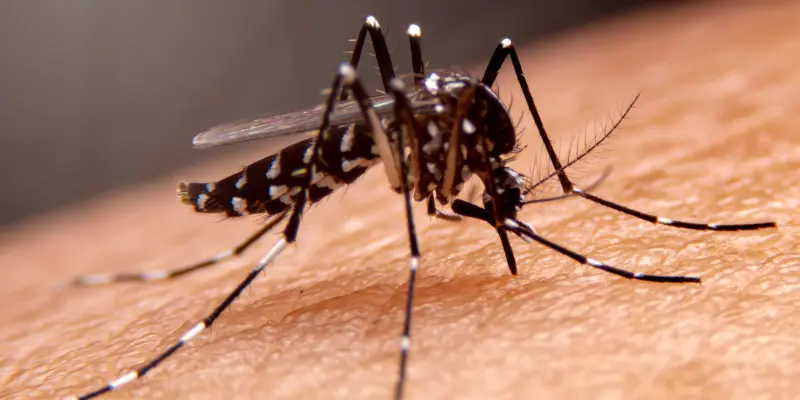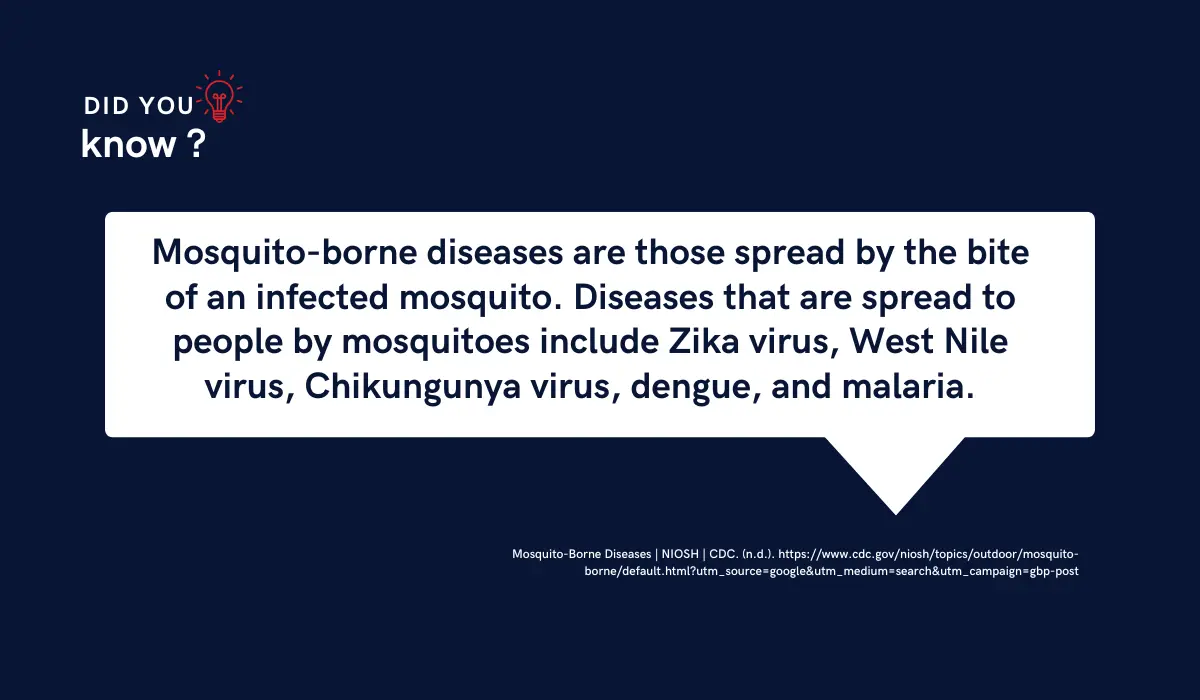
Mosquitoes can turn a peaceful night’s sleep into a restless ordeal. Not only do their bug bites cause annoying itchy welts, but their buzzing can also disrupt your slumber.
More importantly, these pests can carry diseases like dengue, West Nile Virus, and Zika Virus, making it essential to prevent their bites.
Besides citronella candles and perfumes, how do you keep these pesky insects at bay while you sleep? Keep reading for proven tips to help you enjoy undisturbed, bite-free nights.
Key Takeaways
- Freshening up before bedtime, including showering and changing clothes, reduces scents and skin exposure that attract mosquitoes.
- Employing physical barriers like mosquito nets and window screens can prevent mosquitoes from entering sleeping areas.
- Using EPA-approved repellents and DIY sprays may protect you against mosquito bites and mosquito-borne diseases.
- Modifying bedroom conditions and using mosquito-repelling plants like lavender and citronella for natural prevention.
- When DIY methods fall short, consider professional mosquito control services to effectively manage and reduce mosquito populations.
BEST PRACTICES TO AVOID MOSQUITO BITES WHILE SLEEPING
Ensuring a good night’s sleep without the nuisance of mosquito bites involves combining effective ways to get rid of them.
Here’s what you can do to sleep peacefully against the Aedes and Anopheles mosquito species.
Freshen Up Before Bedtime
Freshening up before bed can be an effective strategy to deter mosquitoes. Here’s how to freshen up to minimize mosquito disturbances at night:
| Activities | Benefit |
| Take a Shower | Reduces lactic acid and scents that attract mosquitoes |
| Change Clothes | Less skin exposure and fewer scents to attract mosquitoes |
| Apply Repellent | Adds an extra layer of protection against mosquito bites |
Choose the Right Mosquito Repellents

Using mosquito repellents at night is crucial because they help mask the carbon dioxide you emit.
According to the Centers for Disease Control and Prevention (CDC), this also lowers your risk of mosquito-borne diseases.
When selecting an insect repellent in the form of lotions or creams, consider these active ingredients approved by the Environmental Protection Agency (EPA):
- DEET
- Picaridin
- Oil of Lemon Eucalyptus (OLE or PMD)
- IR3535
- 2-undecanone
Use Mosquito Nets and Physical Barriers
Physical barriers are a non-invasive way to prevent mosquito entry and subsequent bites while you sleep.
To help you choose the right type of physical barrier for your needs, here are your various options:
| Barrier Type | Description | Usage Tips |
| Mosquito Nets | Fine meshed nets that hang above beds | Ensure no holes; tuck under the mattress |
| Bed Nets | Specifically designed for sleeping areas | Use nets treated with permethrin |
| Window Screens | Mesh screens for windows | Check for gaps; repair any tears |
Improve Bedroom Conditions
Mosquito activity can be influenced by the bedroom environment, particularly by temperature and humidity.
Here’s how you can modify your bedroom conditions that may repel them:
- Use air conditioning to lower the temperature
- Reduce humidity with a dehumidifier
- Ensure good airflow with fans
- Keep lights off or use dim lighting
Add Mosquito-Repelling Plants
Introducing mosquito-repelling plants into your bedroom is a natural and aesthetic way to keep these pests at bay.
By strategically placing these plants, you can enjoy their beauty and benefit from their natural repellent properties:
| Plants | Description |
| Citronella | Known for its strong scent that masks other attractants to mosquitoes, ideal around patios and entrances. |
| Lavender | Besides its soothing aroma, lavender deters mosquitoes with its potent essential oils. |
| Marigolds | These bright flowers contain pyrethrum, an ingredient used in many insect repellents. |
| Basil and Rosemary | Not only is it applicable in the kitchen, but these herbs also emit a scent that mosquitoes dislike. |
Utilize Commercial Repellent Devices
Plug-ins are typical commercial repellent devices you may find in stores. These electronic devices repel mosquitoes by releasing insecticides into the air.
Here’s an overview of their features:
- Functionality: They heat the repellent to disperse it into the room, creating a protective zone that keeps mosquitoes away.
- Duration: Most plug-ins offer long-lasting protection, with each refill or pad lasting several hours to several weeks, depending on the product.
- Suitability: Ideal for indoor use, particularly effective in enclosed spaces like bedrooms or living rooms.
Employ Homemade and Natural Solutions
Homemade and natural solutions can complement other preventative practices, ensuring a more diverse approach.
Here’s what you can easily prepare to keep your space pest-free.
| Ingredients | How to Prepare |
| Citronella, lemongrass oils | Mix with a carrier oil and apply to the skin |
| Eucalyptus or tea tree oils | Dilute with water and spray in the room |
Eliminate Indoor Mosquito Breeding Sites
Removing sites where mosquitoes breed is vital in controlling their population indoors.
Take charge of your indoor spaces by following these steps to eliminate mosquito breeding sites around your home:
- Check flowerpots for standing water and drain them.
- Regularly change the water in bird baths.
- Keep gutters clear to avoid water accumulation.
- Store items like buckets upside down to prevent water collection.
Wear Proper Nighttime Clothes
Protective clothing can be an additional barrier against mosquito bites. Consider wearing these essential clothing choices after you freshen up.
| Clothing Types | Reason |
| Long-sleeved shirts | Cover the skin to prevent bites |
| Long pants | Loose-fitting protect legs |
| Socks | Shield feet, a common bite area |
PROFESSIONAL MOSQUITO CONTROL SOLUTIONS
DIY pest control often falls short, especially when keeping pests at bay through the night. That’s why healthcare professionals recommend engaging pest control experts like us.
At LaJaunie’s Pest Control, we provide professional services that effectively stop pests. Here’s what our mosquito control process looks like.
Mosquito Population Management
- Initial Reduction: Our treatments significantly lower mosquito numbers by directly killing many of those that reside on your property.
- Continuous Control: We install the In2Care system, which disrupts breeding within approximately 4,500 sq ft of its placement, ensuring ongoing population control.
Full Yard Protection
- Regular Fogging: Scheduled monthly fogging sessions provide a consistent deterrent against mosquitoes.
- Barrier System: The In2Care system acts as an additional line of defense, preventing mosquitoes from neighboring properties from entering your yard.
Conducive Condition Management
- Expert Inspections: Our trained technicians will inspect your property to identify and inform you of any conditions that support mosquito infestations.
- Preventive Advice: We provide recommendations for addressing these conditions, often without the need for extra pesticides.
Biological Sterilization
- Self-Spreading Pellets: The In2Care system uses biological sterilization pellets that halt mosquitoes’ growth and reproductive cycles.
- Safe for Pets and Wildlife: These pellets are safe to use around pets and in aquatic environments with fish, ensuring your yard remains mosquito-free and eco-friendly.
WHEN TO CALL THE MOSQUITO EXPERTS
Sometimes, despite your best efforts, you can find yourself overwhelmed by mosquitoes in your home.
If you’ve tried various repellents and traps but still find yourself swatting away mosquitoes every night, it might be time to call in pest control experts.
Whether you’re in New Orleans or Baton Rouge, seeking expert help should be easy. For immediate intervention for a severe infestation, let Lajaunie’s mosquito control specialists tailor a solution that’s right for your home.
For more information about the areas we service, visit our location page.